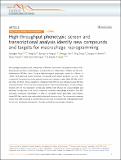High-throughput phenotypic screen and transcriptional analysis identify new compounds and targets for macrophage reprogramming
Author(s)
Hu, Guangan; Su, Yang; Kang, Byong Ha; Fan, Zhongqi; Dong, Ting; Brown, Douglas R; Cheah, Jaime; Wittrup, Karl Dane; Chen, Jianzhu; ... Show more Show less
DownloadPublished version (8.274Mb)
Publisher with Creative Commons License
Publisher with Creative Commons License
Creative Commons Attribution
Terms of use
Metadata
Show full item recordAbstract
Macrophages are plastic and, in response to different local stimuli, can polarize toward multi-dimensional spectrum of phenotypes, including the pro-inflammatory M1-like and the anti-inflammatory M2-like states. Using a high-throughput phenotypic screen in a library of ~4000 FDA-approved drugs, bioactive compounds and natural products, we find ~300 compounds that potently activate primary human macrophages toward either M1-like or M2-like state, of which ~30 are capable of reprogramming M1-like macrophages toward M2-like state and another ~20 for the reverse repolarization. Transcriptional analyses of macrophages treated with 34 non-redundant compounds identify both shared and unique targets and pathways through which the tested compounds modulate macrophage activation. One M1-activating compound, thiostrepton, is able to reprogram tumor-associated macrophages toward M1-like state in mice, and exhibit potent anti-tumor activity. Our compound-screening results thus help to provide a valuable resource not only for studying the macrophage biology but also for developing therapeutics through modulating macrophage activation.
Date issued
2021Department
Koch Institute for Integrative Cancer Research at MIT; Massachusetts Institute of Technology. Department of Biology; Massachusetts Institute of Technology. Department of Biological EngineeringJournal
Nature Communications
Publisher
Springer Science and Business Media LLC